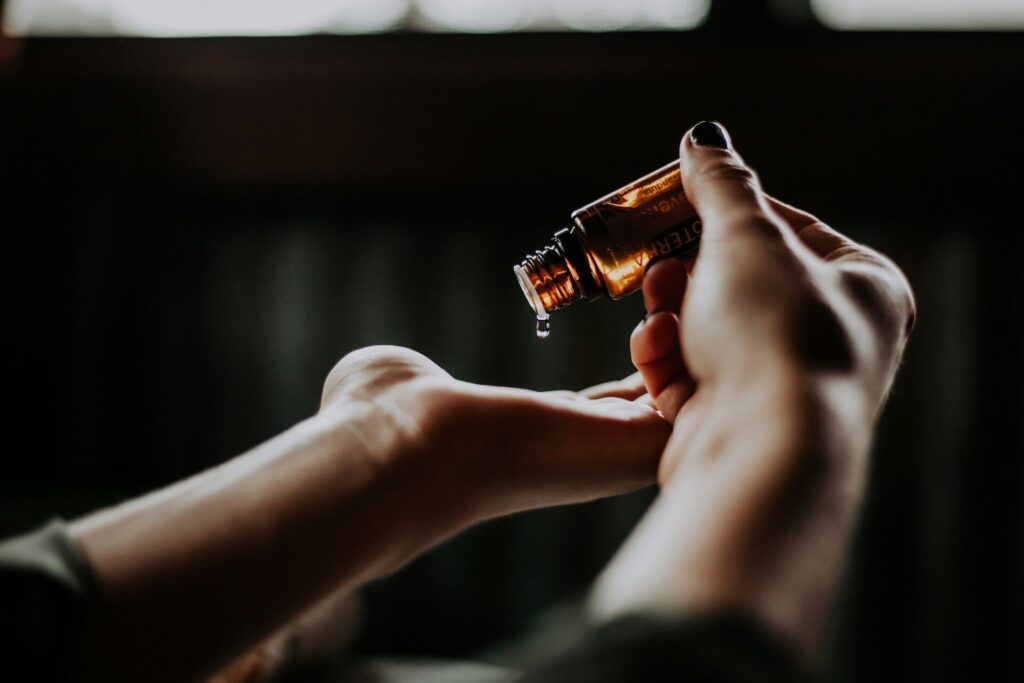
Body + Mind is reader-supported. We may earn an affiliate commission when you buy through some of the links on our site.
Have you been struggling with thinning hair, bald patches or itchy alopecia spots ruining your lovely head of hair? The solution is probably in your kitchen or herb garden — rosemary. The herbal oil is a fantastic way to get the best results, and it’s got surprising benefits that may turn dull and lifeless hair glossy and thick.
Learn how to use rosemary oil for healthy locks and scalp. This year, use herbs for more than just to flavor your veggies or Christmas roast.
For centuries, people have used rosemary for culinary and medicinal purposes. It’s a potent Mediterranean herb with a pungent scent. It’s available fresh and dried and also as an essential oil. Traditional medicines used the herb as an antioxidant, cleaner, anti-inflammatory and memory aid.
While your scalp may have over 100,000 hair follicles, hair thinning and hair loss often occur due to health conditions and poor scalp health.
With millions of TikTok fans jumping on the rosemary trend wagon, the science clarifies why you should join them and enjoy lush locks. Rosemary phytochemicals contain proteins, fats and oils, steroids, amino acids, glycosides, flavonoids and vitamins, significantly improving hair growth when topically applied.

The herbal oil helps your hair growth in several ways:
Now that you know the oil is fantastic for your scalp and hair, it’s time to include it in your haircare routine. As with any new product, it’s wise to test a small patch coated with the oil, mixed in equal parts rosemary oil and a carrier oil like coconut or jojoba oil. Apply a small dab of the oil mix to the scalp area behind your ear. Leave it for a few hours, then rinse and check for irritation the following day.
If there’s no redness or itchiness, you’re safe to apply it to your whole scalp. Here’s how:
This is an optional first step to prepare your scalp. When warm water removes debris from the skin pores, the skin more readily absorbs the oil, and the oil works faster. Rinsing your scalp helps remove any remaining cosmetic chemicals from shampoo or conditioner.
Pat your hair dry, and you’re ready to mix the oil.
Mix a tablespoon of carrier oil and five drops of rosemary oil in a glass vial or bottle. Stir or shake well and apply it generously to your scalp. Avoid rubbing it into the hair, as the real magic happens on your scalp.
Top Tip: If it’s cold where you live, use a glass with warm water to heat the vial or bottle so the oil can gently warm with the heat transference. Don’t make the oil too hot. It works best when it’s lukewarm and runny enough to massage into your scalp.
A safe way to get maximum benefit from the rosemary oil and carrier mix is to rub the oil into the scalp using circular motions gently. Cover your head with seram wrap to prevent the oil from messing on your clothes or furnishings. Leave it covered for an hour, remove the wrap and massage the scalp again.
For maximum benefits, leave the oil to soak into your scalp for at least an hour or two. The longer you can leave it on, the better. If you can completely wrap your scalp and hair in saran wrap, you can leave the oil in while you sleep, which gives it plenty of time to stimulate your scalp and hair follicles.
On the next day, shampoo your hair as usual and repeat twice to thrice weekly for at least six months to see maximum results.
If you don’t have time to soak your head overnight, mix a few drops of rosemary oil into your shampoo. It’s best to mix a drop per pea-sized dollop of shampoo. If you’re unsure how safe it is to combine the herb oil with your shampoo, you can revert to baby shampoo, which is mild and low in chemicals. Apply the shampoo-oil mix to your scalp, scrub gently and allow it to sit for 5-10 minutes before rinsing.

Another easy way to apply the hair-enhancing oil to your scalp is to rinse with a rosemary extract or spray your scalp with the herbal water. Both these methods help rejuvenate your hair and are fantastic for treating itchy scalp while giving you shiny hair.
Heat half a gallon of distilled or spring water in a large pot. Add a bunch of fresh rosemary sprigs or two tablespoons of dried leaves. Simmer for 10 minutes on low heat.
Remove from the heat and allow to cool to room temperature. Before the amber-colored water cools completely, you can add a few drops of rosemary essential oil for extra strength.
Strain the herbal water, removing any organic matter. Wash hair as usual, then rinse with the herbal water, decanting it in small amounts over the scalp while gently massaging with circular motions. Towel dry your hair and let it air naturally before styling as usual.
Using the same mixture as above, decant it into a spray bottle. Apply a light spray to your hair roots daily if you have dry hair or two to three times a week for normal hair. Store the spray in a cool, dark place or in the refrigerator to preserve the natural oils.
The benefits of rosemary are scientifically proven, and it’s a fragrant way to enhance your natural locks. It thickens the hair from the root and encourages renewed hair growth. Whether you set aside time weekly for a long-lasting herb oil soak or choose daily sprays to ensure effective circulation to your scalp and thickened hair shafts, this Mediterranean wonder herb is a natural way to look after your hair.
Your email address will only be used to send you our newsletter, and at any time you may unsubscribe. For more information, see our Privacy Policy.